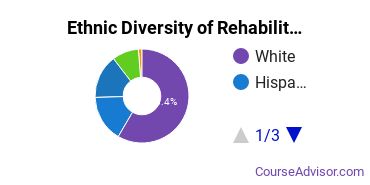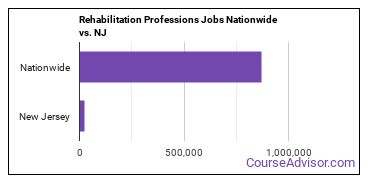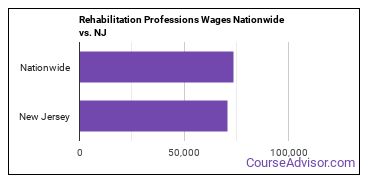Rehabilitation Schools in New Jersey
443 students earned Rehabilitation degrees in New Jersey in the 2022-2023 year.
In terms of popularity, Rehabilitation is the 46th most popular major in the state out of a total 276 majors commonly available.
Education Levels of Rehabilitation Majors in New Jersey
Rehabilitation majors in the state tend to have the following degree levels:
| Education Level | Number of Grads |
|---|---|
| Doctor’s Degree (Research / Scholarship) | 203 |
| Doctor’s Degree (Professional Practice) | 203 |
| Doctor’s Degree (Other) | 203 |
| Master’s Degree | 161 |
| Bachelor’s Degree | 57 |
| Associate Degree | 19 |
| Post-Master’s Certificate | 3 |
| Postbaccalaureate Certificate | 3 |
Gender Distribution
In New Jersey, a rehabilitation major is more popular with women than with men.

Racial Distribution
The racial distribution of rehabilitation majors in New Jersey is as follows:
- Asian: 11.3%
- Black or African American: 6.1%
- Hispanic or Latino: 17.4%
- White: 44.9%
- Non-Resident Alien: 0.2%
- Other Races: 20.1%

Jobs for Rehabilitation Grads in New Jersey
There are 22,810 people in the state and 871,750 people in the nation working in rehabilitation jobs.

Wages for Rehabilitation Jobs in New Jersey
A typical salary for a rehabilitation grad in the state is $70,900, compared to a typical salary of $73,860 nationwide.

Most Popular Rehabilitation Programs in NJ
There are 13 colleges in New Jersey that offer rehabilitation degrees. Learn about the most popular 13 below:
Of all the teachers who work at the school, 58% are considered full time. This public school has an average net price of $22,675. Most students complete their degree in 4.26 years.
Request InformationStudents enjoy a student to faculty ratio of 14 to 1. 100% of students are awarded financial aid at this school. The average student takes 4.09 years to complete their degree at Seton Hall.
Request Information99% of students are awarded financial aid at this school. The full-time teacher rate is 28%. Students who attend this public school pay an average net price of $10,406.
Request InformationMost students complete their degree in 4.24 years. 96% of students get financical aid. The full-time teacher rate is 49%.
Request InformationAn average student at Caldwell will pay a net price of $19,811. 13 to 1 is the student to faculty ratio. Of all the teachers who work at the school, 100% are considered full time.
Request Information59% of students get financical aid. A typical student attending Middlesex County College will pay a net price of $6,117. The student to faculty ratio is 19 to 1.
Request InformationThis public school has an average net price of $15,677. Students enjoy a student to faculty ratio of 17 to 1. The full-time teacher rate is 34%.
Request InformationOf all the teachers who work at the school, 100% are considered full time. The average student takes 4.19 years to complete their degree at Monmouth. This private institution charges an average net price of $30,005.
Request Information84% of students get financical aid. Students enjoy a student to faculty ratio of 22 to 1. A typical student attending Union County College will pay a net price of $7,052.
Request InformationStudents enjoy a student to faculty ratio of 23 to 1. A typical student attending Cumberland County College will pay a net price of $7,455. 100% of students are awarded financial aid at this school.
Request Information10 to 1 is the student to faculty ratio. An average student at Georgian Court will pay a net price of $19,311. The full-time teacher rate is 41%.
Request InformationThis public college charges it's students an average net price of $11,589. 18 to 1 is the student to faculty ratio. 72% of students get financical aid.
Request InformationOf all the students who attend this school, 50% get financial aid. This public college charges it's students an average net price of $6,874. The student to faculty ratio is 19 to 1.
Request InformationRehabilitation Careers in NJ
Some of the careers rehabilitation majors go into include:
| Job Title | NJ Job Growth | NJ Median Salary |
|---|---|---|
| Physical Therapists | 22% | $95,690 |
Related Majors in New Jersey
Below are some popular majors in the state that are similar to rehabilitation.
| Major | Annual Graduates in NJ |
|---|---|
| Health Sciences & Services | 1,471 |
| Public Health | 942 |
| Allied Health Professions | 880 |
| Medicine | 614 |
| Pharmacy/Pharmaceutical Sciences | 348 |
| Allied Health Services | 347 |
| Health/Medical Admin Services | 317 |
| Health/Medical Prep Programs | 303 |
View all majors related to Rehabilitation
Explore Major by State
Alabama
Arkansas
Connecticut
Florida
Idaho
Iowa
Louisiana
Massachusetts
Mississippi
Nebraska
New Jersey
North Carolina
Oklahoma
Rhode Island
Tennessee
Vermont
West Virginia
View Nationwide Rehabilitation Report
References
- College Factual
- National Center for Education Statistics
- O*NET Online
- Image Credit: By Barbara E. Carver under License
More about our data sources and methodologies.





